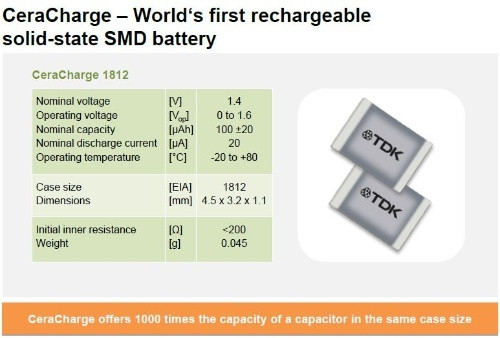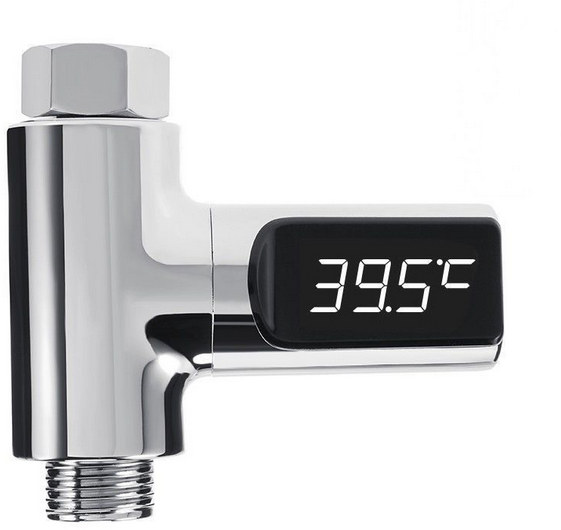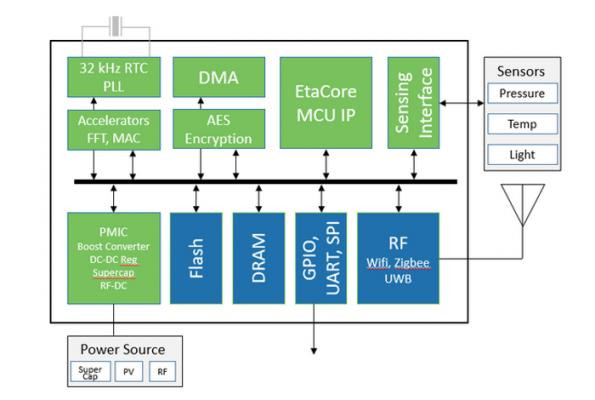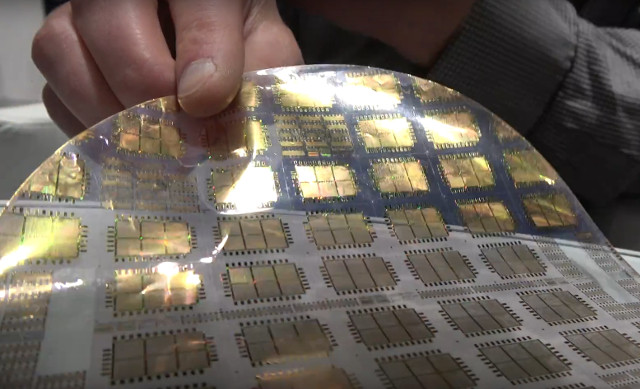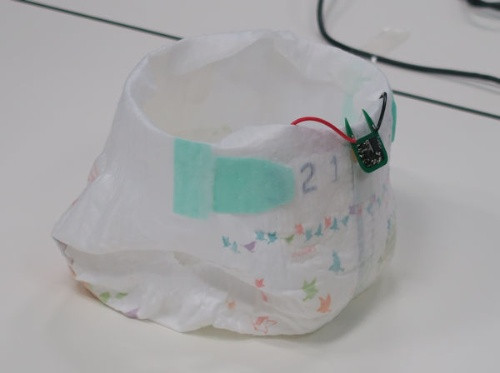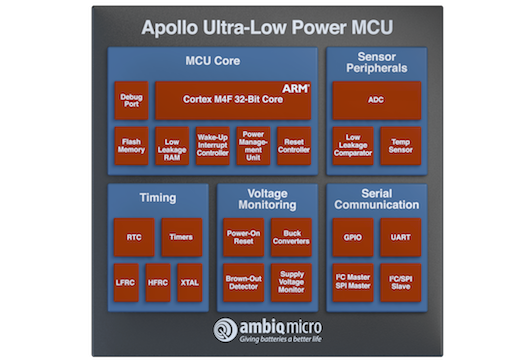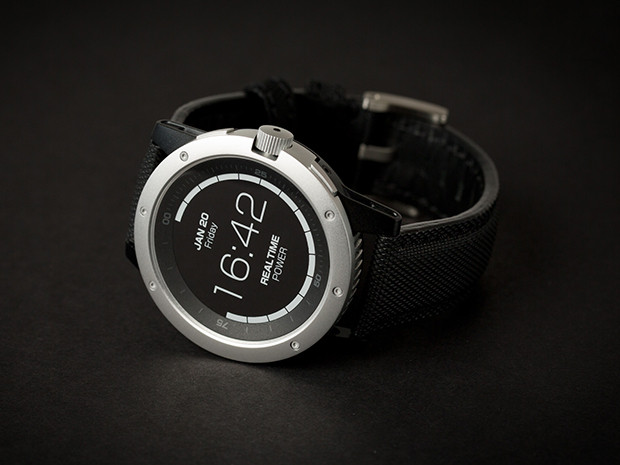We’ve recently seen solid state batteries are prone to dislodge current Lithium Ion battery technology as they are safer, support higher energy density, and faster charging. Such batteries are expected to be seen in car in the first part of the next decade, in smartphones starting possibly in 2019, but TDK has just announced their own CeraCharge rechargeable solid state SMD battery with mass production scheduled to start in April 2018. TDK CeraCharge battery-in-a-chip will come in compact EIA 1812 package (4.5 x 3.2 x 1.1 mm), offer a capacity of 100 µAh at a rated voltage of 1.4 V, and can be recharged up to 1000 times. Potential applications include IoT devices, real-time clocks, Bluetooth beacons, and systems for energy harvesting. The battery – which will look very similar to an SMD capacitor – does not include liquid electrolyte, and instead uses a solid ceramic element as electrolyte which rules out any risk of fire, explosion, […]
$10 Self-Powered Thermometer Displays Shower Water Temperature in Real-Time
I now live in a house with an electric water heater that warms the temperature on the fly to the temperature we set on the display, provided it’s not too cold. But in the past, I lived in colder climates with water pre-heated in a hot water tank, and accessible from most taps in the house. Each time I took a shower I had to adjust the cold and hot water taps, wait a bit and do further adjustments to get the right temperature, not too cold, not too hot. I’ve just come across a little gadget that you ease this process as it displays the water temperature on an LCD display. The installation looks fairly easy, and there’s no need for batteries as it’s self-powered with the flow of water. Some of the key features of the device include: Display – 360-degrees rotatable & waterproof LED display design: and […]
EtaCore ARM Cortex M3 Core Operates at Low Voltage (0.25V and up) for Higher Power Efficiency
We’ve previously seen Ambiq Micro offering Apollo ARM Cortex M4F MCU with Cortex M0+ energy efficiency, and later the upgraded Apollo 2 MCU with even lower power consumption and better performance. The company can achieve such efficiency thanks to low sub-thresold operating voltage in the 0 to 0.5V range. Another startup – Eta Compute – is now offering another low voltage solution with their EtaCore ARM Cortex M3 IP, and other IP blocks operating at low voltage (0.25 to 1.2V). Eta Compute claims a “10x improvement in power efficiency over any alternative”, and battery life of over 10 years on a CR2032 coin cell. Their website does not provide that many details about the core and development tools, but still mentions the following: The only commercially available self-timed technology supporting dynamic voltage scaling (DVS) that is insensitive to process variations, inaccurate device models, and path delay variations Includes M0+ and […]
8Power Vibration Energy Harvesting Technology Powers Batteryless LPWAN GPS Trackers, MEMS Sensors
While IoT products usually promises one to 10 years battery life, they will be several billions of them, and ARM’s CEO even forecast one trillion IoT devices in the next 20 years. Recharging batteries at home may be fine, but imagine having to recharge or replace batteries on top of electric poles, inside walls, in remote locations, and other hard to reach places, considerable resources would have to be deployed just to replace or recharge battery every year or whenever the battery is close to being depleted. That’s why work on energy harvesting technology for batteryless devices may be so important, and 8Power is one of the companies working in the field through their vibration energy harvesting technology that is said to harvest up to 10x the power of competing devices under comparable condition thanks to the use of parametric resonance phenomenon. The company has recently announced their Track 100 family […]
PragmatIC Manufactures Ultra Thin and Flexible Plastic Electronics Circuit, Plastic ARM Cortex M0 MCU Coming Soon
Electronics manufacturing now relies on silicon wafers, and it works great for many applications. However, some other applications require or benefit from a cheaper price, thinner circuits, and flexibility, and PragmatIC addresses all those three issues with technology to print electronics circuits on plastic sheets. The technology is said to costs less than 1/10th cost of silicon, with the circuit printed on 10 μm thick flexible plastic “wagers” with support for 10 layers. Circuit starts from basic gates up to ARM Cortex M0/M0+ chip as shown above. Simpler circuits are currently sold for as low as $0.01, but the area for Cortex M0 MCU is 1cm2, and a bit too big for commercial applications, so they plan on shrinking the process to make it commercial viable. ARM is an investor in the company, and PragmatIC is ramping production capacity with the ability to manufacture on billion plastic chips/circuits in 2018. […]
Batteryless, Urine Powered Smart Diapers Notify You When It’s Time to Change Them
One of the downside with current smart wearables is that most need to be recharged quite often, every day, week or month, and we’re still a long way of 10 year battery life offered by typical watches. I’m hopefully that eventually many devices won’t need to be recharged at all as we’ll have made improvements both in terms of power efficiency and energy harvesting using solar, body heat, vibrations and other techniques. Takakuni Douseki, professor at the Department of Electronic and Computer Engineering of Ritsumeikan University, has been working on micro energy harvesting, and his latest “wireless involuntary urination sensor system” notifies the user when it’s time change the diapers without the need of any battery, instead using energy generated by urine and stored in a capacitor in order to transmit the data wirelessly. The prototype is using a modified baby diaper with a 320x5mm activated carbon piece, and a […]
Ambiq Micro Introduces Ultra-Low Power Apollo 2 Cortex-M4F MCU Consuming Less than 10 μA/MHz
Last year Ambiq Micro unveiled their Apollo Cortex-M4F MCU with Cortex M0+ energy efficiency thanks to operation in sub-threshold voltage (< 0.5 V), and the MCU is said found in Matrix Powerwatch, a fitness tracker powered by body heat that you never need to charge. The company has recently announced a new version of the micro-controller with Apollo 2 MCU with better maximum performance thanks to a higher maximum clock speed (48 MHz vs 24 MHz), and higher efficiency (10 μA/MHz vs 30 μA/MHz @ 3.3V). Apollo 2 MCU key features and specifications: Ultra-low supply current <10 μA/MHz executing from flash at 3.3 V <10 μA/MHz executing from RAM at 3.3 V ARM Cortex-M4 Processor up to 48 MHz with FPU, MMU, wake-up interrupt controller with 32 interrupts Ultra-low power memory Up to 1 MB of flash memory for code/data Up to 256 KB of low leakage RAM for code/data […]
Meet Body Heat Powered MATRIX PowerWatch, The Activity Tracker You Never Need to Charge (Crowdfunding)
There are currently several issues with wearables that makes it sub-optimal devices, from displays that can’t be always-on, to unreliable sensors, and in my experience pretty poor reliability, as I’ve managed to go through 4 fitness trackers / smartwatches in a year. Another issue is that contrary to typical watches lasting 10 years with a coin cell battery, most wearables require to be charge every few days, weeks, with the very best devices being chargers every few months. MATRIX PowerWatch promises to solve latter, as you will never need to ever charge it since it charges itself by harvesting energy using your body heat. The company promotes it as a smartwatch, but it’s closer to an activity tracker, since you can’t keep the Bluetooth LE connection all the time in order to receive notifications to your smartphone. It’s basically used to show time, track your activity and sleep patterns, and […]


